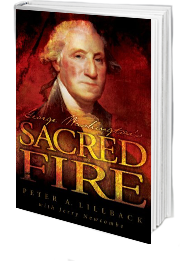Providence Today: A Chat with David Barton
This is Providence today and welcome to Valley Forge. We’re finishing the third of our studies on the popup museum called 12 Score and Three Years Ago. It’s a very exciting program through Glenn Beck. And in the process of telling that story, we caught up with a very important and exciting historical student, David Barton.
David Barton:
In the Declaration of Independence, Jefferson did the original draft of that. There were five on the committee chosen to write that and John Adams said, “Hey Tom, you’re the guy. You’re really good on this.” Jefferson was not a great speaker, but he was a great writer. Jefferson is the guy who did the initial draft and then John Adams and Franklin made a few changes. Robert Livingston and Roger Sherman didn’t make hardly any changes at all. When you look at the original draft, it starts out with 161 words, it sets forth six principles from American government, follows it up with a bunch of grievances.
David Barton:
“Hey, Great Britain, you’re violating these principles so we’re splitting.” The longest grievance Jefferson wrote, was a denunciation of the slave trade. In 1773, you had Rhode Island, Connecticut, Pennsylvania, and Massachusetts that passed anti-slavery laws. In 1774, King George III vetoed every American anti-slavery law and said, “No, no, no. You’re part of the British empire. We have slavery. You’ll have slavery.” That’s when people like Benjamin Rush and Ben Franklin signers of the declaration said, “Let’s not be part of the empire anymore. We want to be anti-slavery.” That sentiment was there.
David Barton:
Jefferson, the longest grievance he wrote in the declaration said, “We’ve tried to do things to end slavery. He keeps imposing it on us against our will.” It was longer than anything about taxation not representation or anything else. It didn’t make it in the final draft of the declaration, because at the top it says, “The unanimous declaration of 13 United States of America.” They knew that if we weren’t all united on what was in that document, Great Britain would pick us off and turn one of us against another and hit an issue that somebody was upset over.
David Barton:
Everything in it was unanimous. Jefferson said that North Carolina, South Carolina and Georgia did not want to end the slave trade. Although 10 did, three didn’t so it didn’t make it in the final draft of the declaration. Jefferson’s own hand, he writes it out. He writes when he talks about African Americans, he says, “men”. He does not call them property. Those in south, they’re not people they’re property. Jefferson said “men”. He wrote it in capital letters. The only word, other than title that he put in capital letters. And he said, the so-called Christian King of great Britain wouldn’t let us in slavery. And he underlined Christian. It’s like this, guy’s a hypocrite. And he says, he is Christian. He’s not loudest in slavery, so that was Jefferson’s strong personal feelings. Didn’t make it in the final draft, but it wasn’t because he didn’t want it to be there, because he drafted that, that’s what he wanted. Just didn’t make it because of North Carolina, South Carolina and Georgia.
Speaker 3:
I was never taught that about the first draft. We I’ve had that draft of the declaration. That’s from 1826. I’ve had that engraving for years and it wasn’t until I was just sitting here and it was down in a case that I looked down and I went, “wait a minute. Why is men capitalized” that I looked at it and went, “oh my gosh, look at this. It’s never, ever told.”
David Fluitt:
So just like represented by the cabin here. Right? This is meant to represent these slave quarters, the cabins that these people would be forced to live in. Even though they were trapped in slavery and bondage. They had this light inside of them waiting to get out, waiting for that chance at freedom to come out and change the world. And they did. Each and every one of these people. Although trapped in horrible circumstances, once they gained their freedom, they were able to go out and each individually change the world and then influence other people to change the world. So that’s what we want to leave people with here, that there is hope and they can take an active part into making a change in other people’s lives. And to taking this message out and saving people from situations much like this that are occurring today. Now all over the world.
Speaker 3:
We’re the same kind of people that we were 400 years ago. It’s so ugly. We don’t want to look at it. Just tell the story. Look at it, have your friends look at it. That’s a big help.
Speaker 1:
Having looked at that draft of the declaration of independence by Jefferson, it reminds us of some extraordinary insights we normally don’t get. Such as the emphasis on a Christian King and men all in capital letters. When we realize this fascinating information, it gives us a deeper insight about how America was wrestling with critical issues of morality and freedom in the face of slavery. And of course it raises this very important question for each one of us having learned this material. What will we do? What impact can we make to change the slave trade? That’s just as real today as it was in America’s past. This is the power of history impacting our decisions and our lives in the here and now. What will you do?
